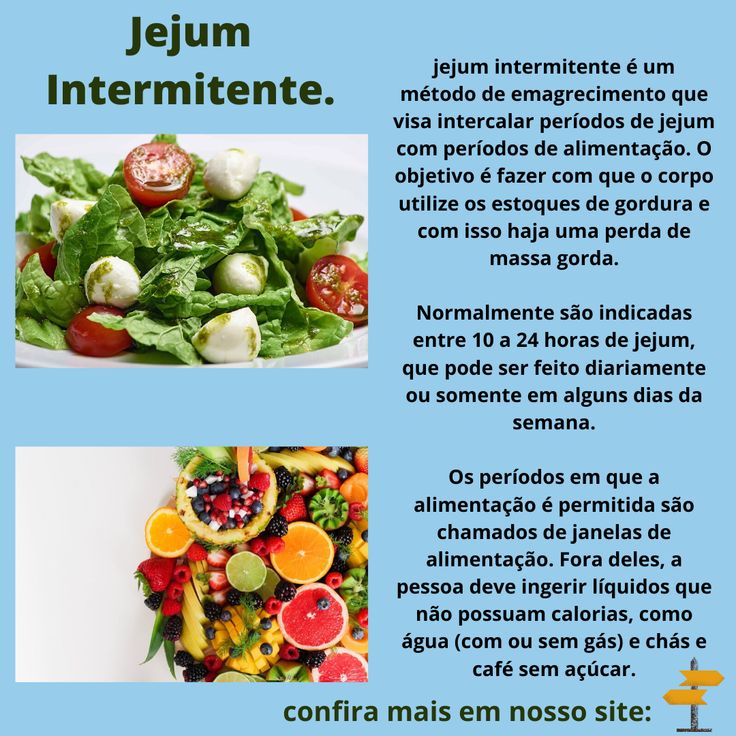o que é permitido na dieta paleolítica Dieta paleolítica: o que é, o que comer e o que evitar
Intermittent fasting is a popular trend for people looking to achieve their weight loss goals and improve their overall health. It involves cycles of fasting and eating, with some variations allowing for certain foods or drinks during the fasting periods. Many studies have suggested that intermittent fasting can bring various benefits, such as reducing inflammation, improving insulin sensitivity, and enhancing the body’s natural self-repair mechanisms. However, it’s essential to understand the limits and risks of this practice, as well as consult a qualified nutrition professional before starting.
The Science behind Intermittent Fasting
Intermittent fasting works by creating a caloric deficit, which leads to weight loss. By limiting the time window for eating, the body has fewer opportunities to consume excess calories and store them as fat. Additionally, intermittent fasting can lower insulin levels, which are responsible for regulating blood sugar and storing fat. This can help the body burn stored fat for energy and improve metabolic health.
Another way that intermittent fasting may benefit health is by stimulating autophagy, a process where cells recycle and dispose of damaged components. Autophagy can remove dysfunctional proteins, damaged organelles, and other debris that can accumulate in cells over time and cause various diseases. Research has also suggested that intermittent fasting may increase longevity, by reducing oxidative stress and inflammation, and enhancing cellular resilience.
Risks and Guidelines
While intermittent fasting can bring various benefits, it’s essential to understand the potential risks and guidelines. First, it’s crucial to consult a qualified nutritionist or healthcare practitioner before starting intermittent fasting, as it may not be suitable for everyone. People with a history of eating disorders, diabetes, or other medical conditions should be especially cautious and seek professional guidance.
It’s also vital to follow safe and healthy eating patterns during the feeding periods. Intermittent fasting is not a license to binge on unhealthy or processed foods, as this can negate any potential benefits. It’s recommended to consume a well-balanced and nutrient-dense diet, including plenty of fruits, vegetables, whole grains, and lean proteins. Drinking plenty of water and avoiding excessive alcohol consumption is also advised.
Lastly, it’s crucial to listen to your body and adjust the intermittent fasting regimen according to your needs. Some people may find it challenging to maintain prolonged fasting periods, while others may experience adverse effects such as headaches, fatigue, or digestive discomfort. It’s essential to pay attention to any warning signs and seek professional help if necessary.
Conclusion
Intermittent fasting can be a powerful tool for weight loss and improving overall health, but it’s not a magic bullet. It requires discipline, patience, and guidance to reap the benefits safely and effectively. By understanding the science behind intermittent fasting, following the guidelines, and listening to your body, you can harness the power of this practice and achieve your health goals.
 Reference
Reference
NutritionFacts.org. (2021). Intermittent Fasting. https://nutritionfacts.org/topics/intermittent-fasting/
Pre-campaigning for an electoral campaign is often an overlooked aspect of running for office. It is a crucial stage in which candidates can lay the groundwork for a successful campaign by building relationships with voters, gauging public opinion, and crafting a compelling message. However, it’s also an area where many candidates may stumble, as it requires navigating a complex set of legal and ethical guidelines.
What is Pre-Campaigning?
Pre-campaigning refers to any activity that a candidate does to prepare for a future electoral campaign, before the official campaign period begins. This can include activities like attending public events, speaking to voters, distributing campaign literature, preparing a campaign budget, and establishing a website or social media presence. Pre-campaigning can be a critical stage for candidates, as it allows them to build momentum, gain name recognition, and establish a platform for their candidacy.
The Rules of Pre-Campaigning
However, pre-campaigning is not a free-for-all activity. There are numerous legal and ethical guidelines that candidates must follow to avoid running afoul of the law or damaging their reputation. For example, many jurisdictions prohibit candidates from spending money on pre-campaigning activities unless they have registered as a candidate and established a campaign account. Similarly, candidates must be cautious not to engage in activities that may be seen as bribery or undue influence, such as offering gifts or favors to potential supporters.
Another essential aspect of pre-campaigning is establishing a clear and coherent message. Candidates must develop a compelling narrative that resonates with voters, based on their values, experiences, and policy proposals. A strong message can help mobilize grassroots support and differentiate a candidate from their rivals. However, candidates should also be careful not to overstep ethical boundaries or make unrealistic promises that they cannot deliver.
The Benefits of Pre-Campaigning
Despite the challenges and risks, pre-campaigning can provide numerous benefits for candidates. By establishing relationships with voters and key stakeholders early on, candidates can gain valuable insights into local issues and concerns. This, in turn, can help them develop a more effective campaign strategy and messaging strategy that resonates with voters.
Pre-campaigning can also be an opportunity for candidates to establish a positive public profile and build name recognition. By attending public events, speaking to groups, and engaging with the media, candidates can raise their visibility and establish credibility as a serious contender. This can be particularly important for candidates without prior political experience or name recognition.
Conclusion
Pre-campaigning can be an immensely valuable and rewarding stage for candidates, but it requires diligence, caution, and attention to detail. By following the legal and ethical guidelines, developing a compelling message, and engaging with voters and stakeholders, candidates can lay the groundwork for a successful campaign and achieve their political goals.
 Reference
Reference
Campaign Legal Center. (2021). Pre-Election Activity. https://www.campaignlegalcenter.org/issues/pre-election-activity
If you are looking for jejum intermitente em 2020 | Jejum intermitente, Alimentação, Nutricionista you’ve visit to the right place. We have 5 Images about jejum intermitente em 2020 | Jejum intermitente, Alimentação, Nutricionista like Dieta do Paleolítico: o seu Interesse na Saúde e Atleta - Blog, O Que é Permitido na Pré-Campanha Eleitoral | Eleitor Online and also O Que é Permitido na Pré-Campanha Eleitoral | Eleitor Online. Read more:
Jejum Intermitente Em 2020 | Jejum Intermitente, Alimentação, Nutricionista
 www.pinterest.comDieta Do Paleolítico: O Seu Interesse Na Saúde E Atleta - Blog
www.pinterest.comDieta Do Paleolítico: O Seu Interesse Na Saúde E Atleta - Blog
 goldnutrition.ptDicas Práticas: O Que É Permitido (E Não) Fazer Na Gravidez | Empório
goldnutrition.ptDicas Práticas: O Que É Permitido (E Não) Fazer Na Gravidez | Empório
 www.emporiosemalcool.com.brO Que é Permitido Na Pré-Campanha Eleitoral | Eleitor Online
www.emporiosemalcool.com.brO Que é Permitido Na Pré-Campanha Eleitoral | Eleitor Online
 www.eleitoronline.com.brDieta Paleolítica: O Que é, O Que Comer E O Que Evitar - Dourados News
www.eleitoronline.com.brDieta Paleolítica: O Que é, O Que Comer E O Que Evitar - Dourados News
 www.douradosnews.com.brDicas práticas: o que é permitido (e não) fazer na gravidez. Dieta do paleolítico: o seu interesse na saúde e atleta. Jejum intermitente em 2020
www.douradosnews.com.brDicas práticas: o que é permitido (e não) fazer na gravidez. Dieta do paleolítico: o seu interesse na saúde e atleta. Jejum intermitente em 2020